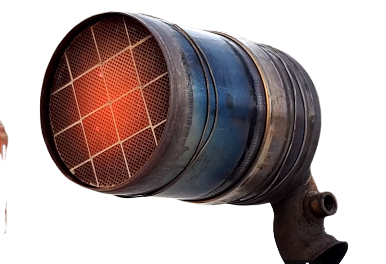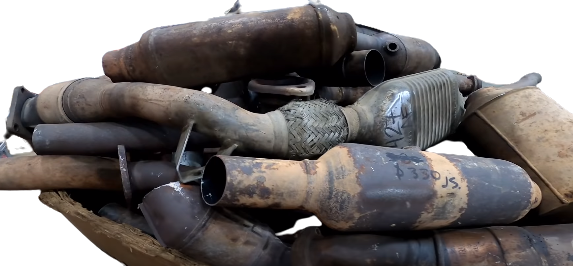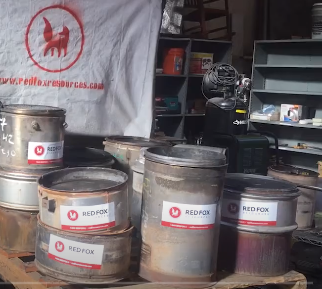There are a host of options when choosing the best DPF buyers. Your DPF recycling company of choice will depend on different factors, including customer service, prices, safety, and environmentally-friendly practices. First, let’s talk briefly about DPFs.
Diesel particulate filters are found in engines to remove diesel particulate matter. The old ones can be recycled or sold when no longer needed. A DPF recycling company is here to help.
There can be severe economic and legal consequences if you don’t recycle your DPFs. Make sure you don’t wholly delete but instead replace it.
First option
Get rid of the DPF or you can also scrap it. The scrap value of a DPF filter is approximately $5, and it takes longer than it’s worth.
You can recycle DPFs more than 10x the amount. So scrapping these parts is like throwing money in a fire. It doesn’t make financial sense to give these parts to scrap yards and landfills.
Second option: Get rid of the DPF
You can also throw the item away. You could also be violating hazardous waste disposal laws. Dumping is not something you can do or have the money to do because it is a wasteful way to spend your time, money, or take on legal risk.
Third option: You can pay someone to pick up the DPF
You could hire someone else to come and get it. Why waste money again? Your DPFs are recyclable, and you can resale them. It is financially irresponsible to pay someone to take your valuable asset.
The best option: Recycle your DPF and replace it
Many companies will pay you for your -used DPFs. These companies won’t waste your time or money and pay you back for the parts.
We compiled a list ofDPF recycling companies and shared it below.
DPF Recovery
DPF Recovery is a company that recycles DPFs and DOCs. They also sell filters. They are located in Somerville (AL) and have a website containing their information. DPF Recovery offers quotes via email for your parts. You can email the office with your part numbers and other pertinent information to get a quote.
A sales representative will contact you, and, if accepted, they will ship your parts free of charge. They can recycle all models and makes of DPFs or DOCs from major manufacturers.
They accept aftermarket units. They work with many reputable brands, including Isuzu and Engelhard, Caterpillar and Volvo, Mack, Donaldson Filtration Solutions, Donaldson Filtration Solutions, Caterpillar, Caterpillar, Volvo, Mack, and Detroit Diesel. DPF Recovery is a certified DPF buyer and has an excellent reputation.
FSX Recycling

FSX Recycling is a division of FSX Reconditioning, the largest DPF remanufacturing firm on the continent. This company works with some of the largest engine companies around the globe to clean and recondition DPFs.
FSX Recycling prides itself in reusing DPFs and DOCs to recover the metal they contain. FSX Recycling was named one of Seattle Business’s top 50 green businesses in 2011, highly regarded as a reliable recycling company that purchases DPFs.
According to FSX, the DPF purchasing price depends on many factors, including the initial component design, variance in the precious metal coatings, and erosion. After they have performed some tests to get an idea of the value of your part, they will give you a price quote.
You can find FX at Granite Falls, Washington, and all contact information is on their website.
Scrap DPF Buyer

ScrapDPFBuyer.com, a recycling company, buys a wide range of scrap materials and parts. DPFs are one of the parts they purchase. You can find calculators on their website that will allow you to determine the amount you will receive for your DPFs.
Searches are by code or category. This tool is handy because it provides a rough estimate of what you can expect to receive without contacting a sales representative.
The company will purchase any amount of scrap you have. They emphasize that they do not accept large loads. They can pick up your parts locally, or you can ship them in, saving you the hassle of packing up your pieces and sending them back. ScrapDPFBuyer’s website has tons of testimonials. They seem to be a reliable company with excellent customer support.
They focus on good customer service, environmentally-friendly recycling, and reasonable prices for your parts.
DPF Recycler
DPF Recycler, a scrap metal buyer company, has a user-friendly, easy-to-use website. They accept DPFs that have been broken, melted, or cracked, and they are responsible for handling all materials. DPF disposal has the following issues. DPFs sold to recycling yards can lead to liability issues.
There is no consistent pricing structure for DPFs. The benefits of long-distance recycling companies offset the shipping costs. You can use their website to fill out a contact form to receive a courtesy phone call.
This company’s process has no negative impact on your daily operations and is highly efficient. They will make recycling profitable, sustainable, and efficient.
DPF Systems
DPF Systems purchases DPF systems and pays you back. Although their website is not very attractive, it is functional.
You can use the search bar to search for products or narrow it down by product category and complete a form to sell your DPF system. Once you have received the confirmation email, please fill it out and bring it to the parts department for payment.
You can also send your parts via the form. Call their company to arrange a pickup.
The company purchases all DPF systems.
They accept PayPal, Check, Cashier’s Check, and Money Order. Wire Transfer, Walmart 2 Walmart, Bank Money Order are payment options.
Red Fox Resources

Red Fox is a trusted recycling company. They will purchase from any company but won’t buy directly from truck owners because of shipping costs. The organization is based in Oakland, CA, and requires 10 DPFs for each shipment.
Their experts have created many pages on DPF recycling. You can request a quote and fill out the contact form on their site before contacting you to confirm.
Red Fox Resources is a combination of regulatory and technical expertise. They have decades of experience in these combined areas. Red Fox is a trusted company that will provide prompt payment and care for you. Red Fox guarantees payment within 15 days of receiving your parts. They only accept company checks for payment and don’t offer cash.
Summary
There are many options for buying DPF online or a local company.
You are looking for top dollar for your parts, but you also want to be treated as a valued customer. It would help look for these three characteristics in any recycling company you choose. Professionalism is essential to find a company that presents itself professionally both online and in person.
An expert company with the proper industry knowledge and experience will help you to recycle your parts safely while also releasing any liability. To get the best price, shop around for different offers.
You have all the information about the DPF filter. Many companies can provide you with good service and are reliable. Now you need to decide which one works best for your needs.
According to the EPA, one crucial point to remember: deleting a DPF is illegal. Also, improperly disposing of your DPF is unlawful, and this article intends to inform you about the legal, safe, and emission-friendly options.
1. Don’t throw away your DPFs or DOCs!
DPFs and other catalyzed emission control components are not garbage. The recycled value of diesel Particulate Filters and Diesel Oxidation Catalysts (DOCs) depends upon the presence of Platinum Group Metals, usually $10-700 per part. Manufacturers coat DPFs and DOCs’ substrates with PGM (Platinum Group Metals). The amount of PGM determines the recycled value in each piece. Reputable DPF or DOC recyclers will provide a price based upon each part number.
2. Recycling Values
There are many options for determining the PGM content of each DPF/DOC. PGM in each DPF or DOC can vary significantly from manufacturer to manufacturer. A single manufacturer could use different PGM coatings for various engine models and years. The market price determines their recycled value for PGM and how much PGM each part contains. Some features of post-2010 engine models do not have a recycled value.
3. Recycling Process (DPF/DOC)
There may be differences in the process of recycling DPFs or DOCs, depending on which recycler you are. There are a few standards that DPF and DOC recyclers who are reputable should follow. Recyclers must provide a quote based on the part number, arrange freight transportation or pick up, and pay for the parts within a reasonable amount of time (typically no more than 45 days). They should also keep a written record. Red Fox has worked closely with the top companies across North America.
4. Recycling vs. Scrapping
Many fleets, service companies, and salvage yards claim they “recycle” spent DPFs or DOCs. They do this by placing them in the company’s scrap metal bin and then having the local scrap metal company pick them up. Although it might be true that scrap metal companies are reclaiming the steel housings of DPFs or DOCs, they rarely pay you for the PGM (Platinum Group Metals). If your scrap metal bins include DPFs or DOCs, your company may not be maximizing the value of these high-value parts. The scrap metal value is typically returned 10 to 100 times by the PGM in the DPF/DOC substrate. If you include emission components in your scrap collection bins, make sure you ask your scrap metal company about the amount they are paying you for PGM. Also, check if your statement includes this information. If the PGM and scrap metal housing are not recycled, you will miss out on a higher payout.
5. Hazardous Waste Risk
It is crucial to remember that hazardous waste compliance is 100% your responsibility. Understanding local regulations is key to determining potential contaminants in your waste. There are different thresholds to classify junk as hazardous.
An experienced specialized recycling company that processes DPFs/DOCs should be able to guide you through the process to determine the classification of your DPFs/DOCs. Red Fox Resources has performed multiple independent laboratory tests on DPFs/DOCs and can assist companies in making this determination based upon our many years of experience.
6. Request a Quote
Experienced recyclers will usually provide an estimate of your parts’ value before you schedule a pickup, letting you know how much you’ll make on the front end. These recycling estimates have an expiration date based on the current market price for precious metals (PGM).
Buyers who don’t give a written estimate, or indicate in writing when the assessment expires, should be avoided. These are good practices that protect buyers and sellers from fluctuations in the PGM market prices.
Before they can give you an estimate, recyclers may ask for photos or part numbers. Part numbers are not always readily available. In this instance, knowing the make and year of the engine will often suffice to provide an estimate.
Red Fox Resources, for example, issues price quotations that are valid for 15 calendar days after providing a part number. If a part number isn’t available to estimate, it will change once the parts are ready for inspection.
7. Shipping
Reputable DPF/DOC recycling businesses often offer free shipping or local pickup/delivery to their center. There are usually minimum quantities to be eligible for free shipping. However, this is often a massive deal for the seller who recycles more than 10 DPF/DOC parts per transaction.
These free shipping programs target fleets, dealers, and dismantlers recycling multiple parts but not individual vehicle owners. Please get in touch with your recycler for a quote for ten or more details.
8. How to Get Paid
It shouldn’t be challenging to get paid by your recycler. Ask your recycler about the average payment time once you have received the parts. Also, ask how to make payments (e.g., company check, wire transfer, cash, or other).
Once the pieces have been received and inspected, it is common for the process to take between 15-45 days. If your recycler does not pay within 45 days, look for another recycling partner. Depending on the regulations in your area, there may be many sellers (fleets or dealers, etc.). Only recyclers who use a “compliant” process (explained below, item #9) will be accepted.
9. Compliant Process
Is your recycler able to provide written records of every transaction, including the part number details? Some buyers and collectors may want to buy scrap DPF or DOC cores for cash, which is not a problem in itself. To limit your risk as a seller, you can keep a written record to protect your company and yourself from any future liability. These may include laws restricting the sale or disposal of DPF/DOC parts and other regulations. Your location and local regulations will determine your potential liability. It is your responsibility to learn about them.
10. Sustainability
Many companies talk about creating a sustainable supply chain. Producing products from reusable materials is cheaper than new raw materials and reduces waste. It also ensures that products are always available. Businesses can encourage a sustainable supply chain and keep costs down by recycling DPFs or DOCs.
A fleet or shop that recycles a DPF supports sustainability to reduce the need to mine new materials and increase the supply of a rare product, keeping the cost of new DPFs and DOCs down.
11. Online Tools (Quotes & Shipping)
Online tools are available from many leading recycling companies to speed up the process. You should know a few things: 1) frequently asked questions; 2) pricing and pricing tools; 3) scheduling free pickups and shipments; 4) getting paid electronically. These tools are user-friendly and can make recycling DPFs or DOCs easier, especially when you’re not working.
12. Recycling Services in California
If you are a California-based company, California regulations can make it more challenging to comply with, even for DPF recycling. California is a complex state, and not all recycling companies operate there. Leading fleets, dealers, and repair shops understand the implications of hazardous waste management. They choose a partner who can help them comply with this process.
13. Replacement DPFs
Most equipment operators purchase replacement DPF filters from aftermarket or OEM suppliers but, you can install the DPFs in certain areas (e.g., California). You are responsible for understanding the regulations in your place.
14. DPFs for Aftermarket
Many companies offer DPF filters that are “will-fit” or aftermarket to replace OEM DPFs. While most OEMs offer a core program to recycle or remanufacture older filters, many aftermarket DPF suppliers do not. You will be responsible for properly disposing or recycling your DPFs. A reputable DPF recycling business is the best choice. (Note: California does not allow the use of remanufactured or aftermarket DPFs.
15. Red Flags Possible
It is not a challenging endeavor to find a DPF recycling partner. You want to choose a trustworthy company with the knowledge and experience to match your requirements. Avoid these warning signs:
1) High payouts in comparison to other recyclers;
2) Cash payments with no written record;
3) Shipping/processing DPF Ash without proper labeling/handling it as hazardous waste; and
4) Limited references and business time (e.g., less than 12 months);
5) High turnover;
6) Payouts that take longer than 45 days.

